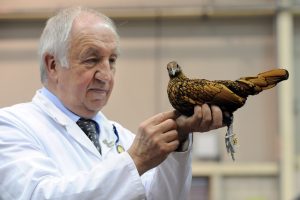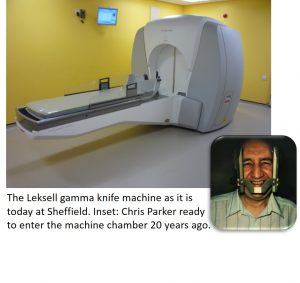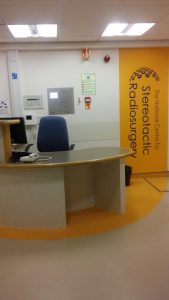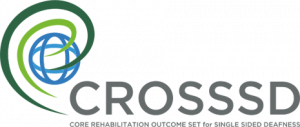May 27, 2021, by Adele Horobin
Acoustic Neuroma 20 Years On In 2021
Single-sided deafness refers to the condition where there is normal or near-normal hearing in one ear and a severe to profound hearing impairment in the other ear. The Core Rehabilitation Outcome Set for Single Sided Deafness (CROSSSD) study is aiming to identify what is critical and important to measure when testing treatments for adults with single-sided deafness.

Mr Chris Parker judging poultry at the Royal Sydney Show, Australia, in 2014
As someone who developed single-sided deafness due to an acoustic neuroma, Mr Chris Parker got involved in the CROSSSD study to include the patient viewpoint. Chris has written the following to share his experiences. Thank you Chris.
 Lying on my back, my head was propelled backwards into the chamber of the Leksell Gamma Knife machine. As I stared at a metal bar just two inches from my nose, the equipment locked into the correct position with a loud clunk that seemed to echo the full length of my body down to the tips of my toes. Almost immediately, in complete contrast, the most soothing music washed over my head and as I closed my eyes my mind was transported to another world, whilst 201 gamma rays were concentrated with pinpoint accuracy onto my tumour. After five minutes the machine stopped and I was propelled back out of the chamber in order for the radiographers to make several programmed adjustments and after resecuring the frame on my head to the machine’s frame the process started again.
Lying on my back, my head was propelled backwards into the chamber of the Leksell Gamma Knife machine. As I stared at a metal bar just two inches from my nose, the equipment locked into the correct position with a loud clunk that seemed to echo the full length of my body down to the tips of my toes. Almost immediately, in complete contrast, the most soothing music washed over my head and as I closed my eyes my mind was transported to another world, whilst 201 gamma rays were concentrated with pinpoint accuracy onto my tumour. After five minutes the machine stopped and I was propelled back out of the chamber in order for the radiographers to make several programmed adjustments and after resecuring the frame on my head to the machine’s frame the process started again.

Reception for the National Centre for Stereotactic Radiosurgery, which is now housed at the Royal Hallamshire Hospital, part of Sheffield Teaching Hospitals NHS Foundation Trust, UK
This point in my treatment at Sheffield’s Weston Park Hospital* was the culmination of hundreds of measurements by a dedicated team of neurosurgeons and radiographers and twenty years later I can remember their names as if it was last week. Today stereotactic radiosurgery is much more common but then the centre at Sheffield was the only place in the U.K. and only the third in the world, where patients could experience this new treatment for brain tumours. Coincidently my elder daughter trained as a diagnostic radiographer at Sheffield two years before my diagnosis and mentioned the time she spent on the amazing Gamma Knife equipment: little did we realise that I would be treated there myself just two years later! I felt extremely privileged at the time and fortunate today that I am so well and able to cope with the deafness and tinnitus that afflicts most acoustic neuroma patients. So much so that as 2020 approached I planned to celebrate my 20th year since diagnosis with a trip to New Zealand. Instead 2020 became the year of the mask: the loss of my travel paling into insignificance as the COVID-19 pandemic grew and many people lost loved ones and many others were unable to visit family members in care homes or hospitals.
Generally, at first, people seemed to struggle with wearing a mask but I remembered from visits to the Far East how easily the population used them every day. I particularly remember my first visit to Japan in 1999 where I found many people wearing masks as I travelled the length of the country, learning that they wore a mask out of respect for their neighbour, a phenomenon I also witnessed when visiting other Asian countries.
Numerous older people, including myself, find hearing to be worse when wearing a mask. Particularly in noisy surroundings and more guidance from research would be helpful as to the best materials for masks when considering hearing. Also masks do not allow for lip reading and even the loss of the ability to read facial expressions is a disadvantage. Another point is that sign language is used for television announcements in some countries, but not all.
However I cannot help but be inspired by the wonderful community spirit that has been on display throughout the pandemic. The claps of support for the NHS and the amazing exploits of Captain Sir Tom raising millions of pounds, has brought the country together in a manner of comradeship not seen since the end of the war in 1945. I am in awe of the heroes of communities throughout the nation who have given time and help so selflessly to the needy in remarkable acts of kindness. Personally I was pleased to be included in the CROSSSD study researching single-sided deafness which turned out to be a fascinating experience. Enthusiastically and professionally led by PhD student Roulla Katiri, the original meeting day had to be cancelled due to travel restrictions but Roulla and the team organised a web-based meeting surmounting all the difficulties with great efficiency. I was enlightened to meet participants who had suffered single-sided hearing loss overnight presenting difficulties I had not experienced before with my contacts through BANA, the British Acoustic Neuroma Association, an organisation dedicated to helping acoustic neuroma sufferers since 1992. BANA certainly helped me twenty years ago to come to terms with my illness and today I look forward to the future very positively.
Chris Parker, aged 74.
*The stereotactic radiosurgery facility is now housed at the Royal Hallamshire Hospital.
For more information about acoustic neuroma, visit the NHS website and the British Acoustic Neuroma Association.
Click on the link to find out more about the National Centre for Stereotactic Radiosurgery, Sheffield, UK. Our thanks to them for kindly providing us with images of their facility.
Carly, another participant in the web-based CROSSSD study meeting that Chris took part in, has written an article about her experience at the meeting on her My Hearing Loss Story blog page.
No comments yet, fill out a comment to be the first


Leave a Reply